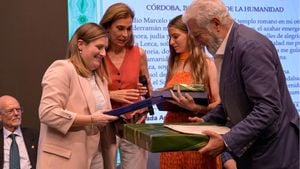Lee Jae-myung, the leader of South Korea's Democratic Party, recently met with Kim Keon-hee, the wife of President Yoon Suk-yeol, marking what many are calling a significant step toward political cooperation amid rising tensions between the parties.
The meeting took place against the backdrop of South Korea's highly polarized political climate, where both leaders expressed the need for increased dialogue to unify the nation. "An important dialogue needed for national unity," Lee stated, framing the purpose of their discussion around collaboration and mutual goals.
Kim Keon-hee reinforced the sentiment by remarking, "We must work together for the common good." This call for unity is particularly timely, as recent events have underscored the divisions within the South Korean political arena.
Although specific details about the meeting's content remain private, it is clear from their statements and the broader political discourse surrounding the event, both figures appear to be seeking pathways to bridge their parties' differences. Analysts suggest this meeting may indicate forthcoming cooperative initiatives, aimed not only at addressing immediate political concerns but also at fostering long-term relationships between the two factions.
Observers note the historical significance of such meetings, especially considering the current situation, where public sentiment is highly reactive to political disagreements. With elections on the horizon, both leaders have much at stake, and their willingness to engage could set precedents for future political interactions.
Further analysis of this meeting will be necessary to understand its full impact on both leaders and their parties. The overall response from the public will play a pivotal role in shaping their strategies going forward. Staying attuned to how this dialogue translates to actionable policy or public initiatives will help determine the effectiveness of such interpersonal engagements.
Moving forward, the political climate of South Korea may very well hinge on the outcomes of this type of dialogue. Strong commitments to unity may resonate with voters, and demonstrate leadership dedicated to overcoming longstanding political rifts.



